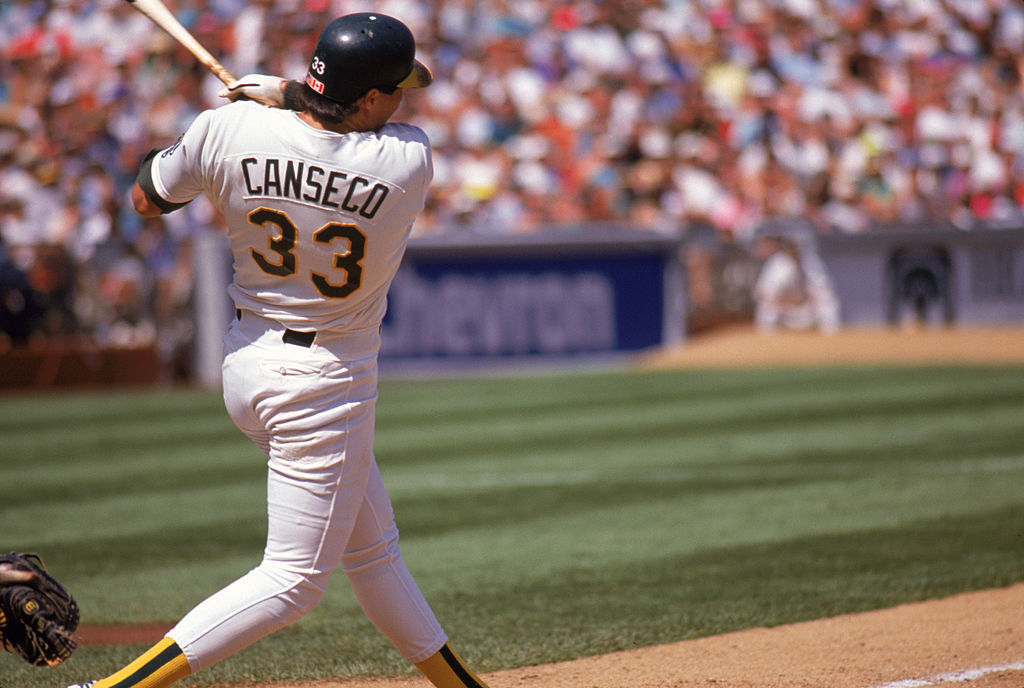MLB
Jose Canseco Earned More than $45 Million But ‘Divorce and Taxes’ Destroyed His Net Worth

During the late 1990s and 2000s, Major League Baseball was full of prolific home run hitters. While we now know that most of them used performance-enhancing drugs, guys like Sammy Sosa, Mark McGwire, and Barry Bonds monopolized the headlines. Another one of those disgraced sluggers, though, was Jose Canseco.
While the former Oakland A’s outfielder may still make the news for his unconventional behavior, things are quite a bit different than his playing days. Canseco earned more than $45 million in the pros but was forced to declare bankruptcy due to divorce, taxes, and a variety of other factors.
Jose Canseco’s Major League Baseball career
Growing up in Florida, Jose Canseco didn’t make his high school’s varsity baseball team until senior year. He still showed enough talent to be drafted by the Oakland A’s, though, and soon made his mark in the minor leagues.
Canseco got his shot in the big leagues as a September call-up in 1985; he batted .302 and hit five homers during his first month in the pros, which was enough to earn him a full-time job. The following campaign, the outfielder belted 33 home runs and drove in 117 runs, en route to the American League Rookie of the Year title.
Once Mark McGwire came to town and became the other half of “the Bash Brothers,” Canseco only improved. In 1998, the outfielder became the first player in Major League history to hit 40 home runs and steal 40 bases in the same season; he was rewarded with the American League MVP award. Before long, though, things would take a turn for the worst.
In August 1992, the A’s traded Canseco to the Texas Rangers. Although he was considered the best player in baseball at that time, injuries started to take their toll on the outfielder; while he would play 11 more seasons, Canseco never reached the same heights as his days in Oakland.
Divorce and taxes take their toll
During his time in Major League Baseball, Jose Canseco hit .266 with 462 home runs and 1,407 RBIs. He made a shade over $45 million for his trouble and, at one time, was the highest-paid player in the league; unfortunately, that money didn’t last forever.
In a 2012 Sportsnet feature, Canseco broke down where the cash from his record-setting $23.5 million contract went. Unsurprisingly, it was divided between the government and paying off some bad decisions.
“Here’s how Canseco, sitting in his living room, legs crossed, breaks down the math on that contract,” Kristina Rutherford wrote. “40 percent went to taxes. His divorce to ex-wife No. 1, Esther Haddad, cost him $6 million and two six-figure sports cars. ‘Divorce and taxes alone are devastating,’ he says. ‘Women are expensive.’
While Rutherford noted that Canseco also spent plenty of cash on cars and had another divorce, the consequences were clear. “What do you have left?” the former slugger rhetorically asked, before forming his fingers into a zero.
Jose Canseco’s bankruptcy in his own words
In 2012, Jose Canseco officially filed for Chapter 7 bankruptcy. Shortly after that news broke, he took to Vice to share his story.
“The issue is very simple,” he explained in a piece called “I’m Broke and It’s the Government’s Fault.” “If you’ve got friends and family, the more money you make, the more you spend on them. So let’s say you spend half your money on them and the rest on yourself and the cost of living. It may so happen that during all of that, you forget to pay your taxes. And then all of a sudden penalties and interest start to add up, and you’re in a pool of quicksand from which you cannot escape.”
While the outfielder then veered into some musings about a refusal to pay taxes and governmental control, his story is all too familiar. Plenty of athletes strike it rich and find themselves with more money than they ever imagined. That blessing, however, can easily turn into a curse.
These days, Jose Canseco spends most of his time firing off bizarre tweets, recording his podcast, and running his Las Vegas car wash. He has an estimated net worth of $500,000; while he could still be worse off, that’s a far cry from his baseball playing days.











